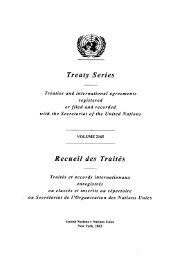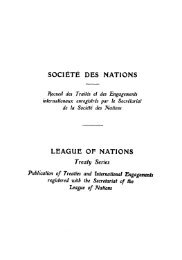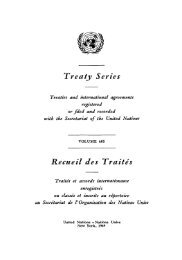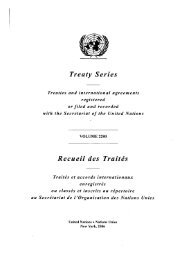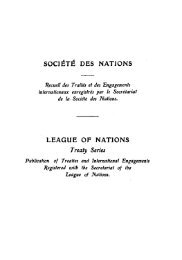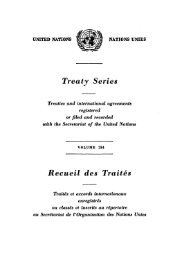Chapter III. Privileges and Immunities, Diplomatic and Consular ...
Chapter III. Privileges and Immunities, Diplomatic and Consular ...
Chapter III. Privileges and Immunities, Diplomatic and Consular ...
Create successful ePaper yourself
Turn your PDF publications into a flip-book with our unique Google optimized e-Paper software.
Section 24<br />
Article VII<br />
ABUSES OF PRIVILEGE<br />
If any State party to this Convention considers that there has been an abuse of<br />
a privilege or immunity conferred by this Convention, consultations shall be held<br />
between that State <strong>and</strong> the specialized agency concerned to determine whether any<br />
such abuse has occurred <strong>and</strong>, if so, to attempt to ensure that no repetition occurs. If<br />
such consultations fail to achieve a result satisfactory to the State <strong>and</strong> the<br />
specialized agency concerned, the question whether an abuse of a privilege or<br />
immunity has occurred shall be submitted to the International Court of Justice in<br />
accordance with section 32. If the International Court of Justice finds that such an<br />
abuse has occurred, the State party to this Convention affected by such abuse shall<br />
have the right, after notification to the specialized agency in question, to withhold<br />
from the specialized agency concerned the benefits of the privilege or immunity so<br />
abused.<br />
Section 25<br />
1. Representatives of members at meetings convened by specialized<br />
agencies, while exercising their functions <strong>and</strong> during their journeys to <strong>and</strong> from the<br />
place of meeting, <strong>and</strong> officials within the meaning of section 18, shall not be<br />
required by the territorial authorities to leave the country in which they are<br />
performing their functions on account of any activities by them in their official<br />
capacity. In the case, however, of abuse of privileges of residence committed by any<br />
such person in activities in that country outside his official functions, he may be<br />
required to leave by the Government of that country provided that:<br />
2. (I) Representatives of members, or persons who are entitled to<br />
diplomatic immunity under section 21, shall not be required to leave the country<br />
otherwise than in accordance with the diplomatic procedure applicable to diplomatic<br />
envoys accredited to that country.<br />
(II) In the case of an official to whom section 21 is not applicable, no<br />
order to leave the country shall be issued other than with the approval of the Foreign<br />
Minister of the country in question, <strong>and</strong> such approval shall be given only after<br />
consultation with the executive head of the specialized agency concerned; <strong>and</strong>, if<br />
expulsion proceedings are taken against an official, the executive head of the<br />
specialized agency shall have the right to appear in such proceedings on behalf of<br />
the person against whom they are instituted.<br />
Section 26<br />
Article V<strong>III</strong><br />
LAISSEZ-PASSER<br />
Officials of the specialized agencies shall be entitled to use the United Nations<br />
laissez-passer in conformity with administrative arrangements to be concluded<br />
between the Secretary-General of the United Nations <strong>and</strong> the competent authorities<br />
of the specialized agencies, to which agencies special powers to issue laissez-passer<br />
7



